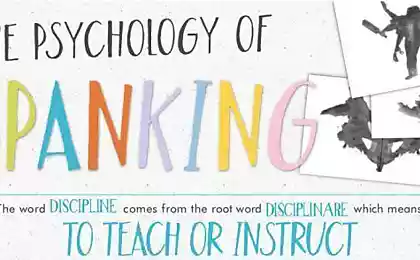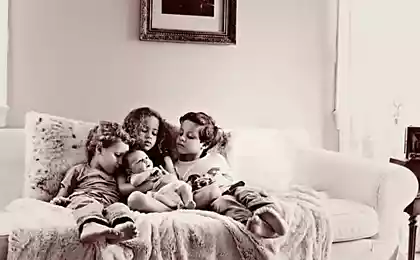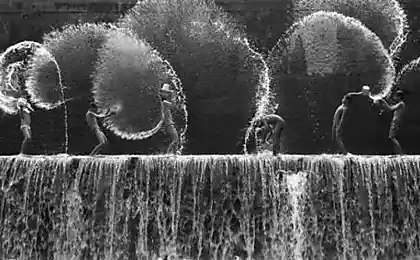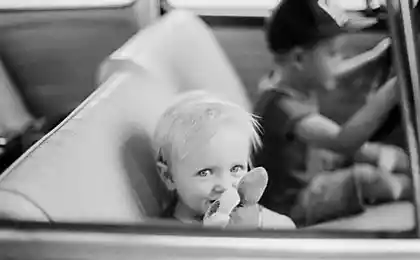809
HYPERACTIVITY in children — 9 MYTHS
Watching the baby, every parent is happy to note when he is very active and cheerful, uninhibited exploring the world, do not hesitate to come into contact with other people, creates something and destroys it, shows signs of independence and self-will.
Because most of us have a firm conviction that an active child is a healthy child.
When the child suddenly diagnosed with ADHD (attention deficit and hyperactivity disorder), many parents, it's scary.
Illness, whether ADHD and what is to be feared, we will try to understand.

Myth 1. ADHD (attention deficit and hyperactivity) is not a disease, this behavior can be found in any cheerful kid
Indeed, sometimes the age peculiarities or traits of the child professionals take for symptoms of disease. And ADHD is really a disease, diagnose it and doctors around the world are quite certain symptoms. If the child is concentrating hard, he does not hear speech addressed to him, can't finish, not able to organize tasks, avoids or reluctant to perform business related to great mental tension, often loses things, easily distracted, forgetful – all this may indicate the violation of attention.
If the baby fidgets, talks too much, makes restless movements of the hands and feet, runs around or gets up, when to sit, can not quietly and play quietly answers without hearing the question, sticks to the outside, intervenes in the conversation, don't like to wait, then most likely, this indicates the hyperactivity and impulsivity.
However, to diagnose ADHD only if manifested no single symptom, and similar behavior can be observed in different everyday situations.
Myth 2. Any specialist working with children can determine ADHD.
Because ADHD is a disease, and about thelimit it can only specialist: neurologist, neuropsychiatrist, psychotherapist. But not the teacher or the teacher on the child's behavior: fighting, running, can't rest on demand, inconsiderate, lazy, "flying in the clouds", is distracted at lessons, etc.
Myth 3. ADHD can be cured with pills.
American doctors do prescribe psychotropic drugs, almost all children diagnosed with ADHD. Our doctors are more cautious in the use of drug therapy. Prescribed medications largely focused on the maturation of brain cells, regulation of processes of inhibition and excitation of the nervous system, etc. Proved that as good results are obtained:
Myth 4. ADHD is an excuse for parents who can't educate their children.
This is not so. As a rule, the development of ADHD in a child is associated with defective structures in the brain. Perhaps during pregnancy or childbirth has taken place oxygen starvation of the fetus, or there is some organic lesion of the brain. And psychosocial conditions of the child's life or reduce symptoms of a disease, or intensified. For example, in more affluent families where a child grows up in love, acceptance and active development, symptoms tend to decrease.
Myth 5. ADHD happens only in young children. Over time the child develops.
Indeed, very often determine ADHD in children of preschool age. However, it is considered unprofessional to diagnose ADHD in children under 3 years, because we have a natural age-related behavior.
Talking about hyperactivityin adolescents 14-16 years is also quite difficult, because increasing responsibility and self-awareness.
However, if untreated, some signs of attention deficit can persist for life. Such people are given hard training, repetitive work, term assignments, challenging assignments, regular communications and contacts. They tend to frequently change jobs, partners in relationships, risk of accidents, can become addicted to alcohol, drugs, and life with them is very difficult.
Myth 6. Half of the children can make the diagnosis of ADHD.
This myth was born due to the fact that many children diagnosed with ADHD are put wrongly. In Russia about 30% in 2012 received a diagnosis of ADHD, and some experts argue that in our age of children "with a motor" is about 90%. In fact, the disease ADHD is found only in 3-7% of children.
Myth 7. ADHD in boys is more common.
Indeed, the syndrome is defined by boys 4-5 times more often than girls, because of the later maturation of the brain.
Myth 8. – Hyperactive children are endlessly working battery, they do not feel fatigue and exhaustion.
In fact it is not – the child would be happy to stay, but can not, the body is the limit, but off does not work. The required time is not included the deceleration of the nervous system, the excitement of individual sections of the cerebral cortex.
Many parents believe that without a tantrum (or child, or parent) to stop the movement and meaningless activity impossible. Calm, careful attitude to the nervous system of the child, timely and adequate sleep, the right alternation of activity and rest, patience, attention, soothing treatments (baths with essential oils, herbal teas, etc.) will help the child to stop.
Myth 9. Children with ADHD poorly in school and have low intelligence.
On the contrary, with the right approach, parents and teachers of these children have an increased intelligence and innovative thinking. Just takes the right organization of the educational process:
Unfortunately, few schools and teachers allow kids to move during recess that children with ADHD is vital.
If parents will raise self-esteem in the child, to build self-confidence through the acquisition of new skills, to build on its achievements in study and daily life, to teach competent communications, and will be able to identify strengths of the child's personality and well developed his higher mental functions, they will be able to overcome all the difficulties associated with ADHD. published
Author: Lilia ahremchik P. S. And remember, only by changing their consumption — together we change the world! © Join us at Facebook , Vkontakte, Odnoklassniki
Source: daniil-mam.livejournal.com/7618.html
Because most of us have a firm conviction that an active child is a healthy child.
When the child suddenly diagnosed with ADHD (attention deficit and hyperactivity disorder), many parents, it's scary.
Illness, whether ADHD and what is to be feared, we will try to understand.

Myth 1. ADHD (attention deficit and hyperactivity) is not a disease, this behavior can be found in any cheerful kid
Indeed, sometimes the age peculiarities or traits of the child professionals take for symptoms of disease. And ADHD is really a disease, diagnose it and doctors around the world are quite certain symptoms. If the child is concentrating hard, he does not hear speech addressed to him, can't finish, not able to organize tasks, avoids or reluctant to perform business related to great mental tension, often loses things, easily distracted, forgetful – all this may indicate the violation of attention.
If the baby fidgets, talks too much, makes restless movements of the hands and feet, runs around or gets up, when to sit, can not quietly and play quietly answers without hearing the question, sticks to the outside, intervenes in the conversation, don't like to wait, then most likely, this indicates the hyperactivity and impulsivity.
However, to diagnose ADHD only if manifested no single symptom, and similar behavior can be observed in different everyday situations.
Myth 2. Any specialist working with children can determine ADHD.
Because ADHD is a disease, and about thelimit it can only specialist: neurologist, neuropsychiatrist, psychotherapist. But not the teacher or the teacher on the child's behavior: fighting, running, can't rest on demand, inconsiderate, lazy, "flying in the clouds", is distracted at lessons, etc.
Myth 3. ADHD can be cured with pills.
American doctors do prescribe psychotropic drugs, almost all children diagnosed with ADHD. Our doctors are more cautious in the use of drug therapy. Prescribed medications largely focused on the maturation of brain cells, regulation of processes of inhibition and excitation of the nervous system, etc. Proved that as good results are obtained:
- establishing a clear mode of the day,
- alternation of load and pauses during the execution of the training or games,
- active and even aggressive game, not aimed at the people and animals
- emotional support (praise, approval, affection),
- proper nutrition.
Myth 4. ADHD is an excuse for parents who can't educate their children.
This is not so. As a rule, the development of ADHD in a child is associated with defective structures in the brain. Perhaps during pregnancy or childbirth has taken place oxygen starvation of the fetus, or there is some organic lesion of the brain. And psychosocial conditions of the child's life or reduce symptoms of a disease, or intensified. For example, in more affluent families where a child grows up in love, acceptance and active development, symptoms tend to decrease.
Myth 5. ADHD happens only in young children. Over time the child develops.
Indeed, very often determine ADHD in children of preschool age. However, it is considered unprofessional to diagnose ADHD in children under 3 years, because we have a natural age-related behavior.
Talking about hyperactivityin adolescents 14-16 years is also quite difficult, because increasing responsibility and self-awareness.
However, if untreated, some signs of attention deficit can persist for life. Such people are given hard training, repetitive work, term assignments, challenging assignments, regular communications and contacts. They tend to frequently change jobs, partners in relationships, risk of accidents, can become addicted to alcohol, drugs, and life with them is very difficult.
Myth 6. Half of the children can make the diagnosis of ADHD.
This myth was born due to the fact that many children diagnosed with ADHD are put wrongly. In Russia about 30% in 2012 received a diagnosis of ADHD, and some experts argue that in our age of children "with a motor" is about 90%. In fact, the disease ADHD is found only in 3-7% of children.
Myth 7. ADHD in boys is more common.
Indeed, the syndrome is defined by boys 4-5 times more often than girls, because of the later maturation of the brain.
Myth 8. – Hyperactive children are endlessly working battery, they do not feel fatigue and exhaustion.
In fact it is not – the child would be happy to stay, but can not, the body is the limit, but off does not work. The required time is not included the deceleration of the nervous system, the excitement of individual sections of the cerebral cortex.
Many parents believe that without a tantrum (or child, or parent) to stop the movement and meaningless activity impossible. Calm, careful attitude to the nervous system of the child, timely and adequate sleep, the right alternation of activity and rest, patience, attention, soothing treatments (baths with essential oils, herbal teas, etc.) will help the child to stop.
Myth 9. Children with ADHD poorly in school and have low intelligence.
On the contrary, with the right approach, parents and teachers of these children have an increased intelligence and innovative thinking. Just takes the right organization of the educational process:
- the fractional presentation of the material,
- repetitive,
- control of knowledge and mastering of educational material,
- check homework
- proper rewards and punishments as deprivation of rewards,
- the use of various techniques of enhancing attention and always active pause.
Unfortunately, few schools and teachers allow kids to move during recess that children with ADHD is vital.
If parents will raise self-esteem in the child, to build self-confidence through the acquisition of new skills, to build on its achievements in study and daily life, to teach competent communications, and will be able to identify strengths of the child's personality and well developed his higher mental functions, they will be able to overcome all the difficulties associated with ADHD. published
Author: Lilia ahremchik P. S. And remember, only by changing their consumption — together we change the world! © Join us at Facebook , Vkontakte, Odnoklassniki
Source: daniil-mam.livejournal.com/7618.html
Baths for health and beauty — 7 ways to relax
The beginning of the end: fossil fuels lost the race to renewable energy























